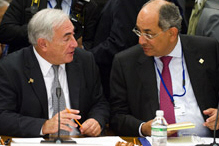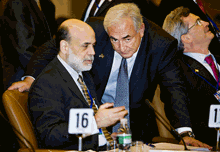
Typical street scene in Santa Ana, El Salvador. (Photo: iStock)
IMF Survey: World Finance Chiefs Back Action Plan to Combat Crisis
October 11, 2008
- World finance ministers back G-7 action plan
- Strauss-Kahn says meeting is "first big success" of global coordination
- Fund asked to lead in drawing lessons from crisis and recommending further action
World financial leaders endorsed an action plan announced by the seven leading advanced economies to combat the international financial crisis in what IMF Managing Director Dominique Strauss-Kahn called the "first big success in coordination" to halt the downward spiral in world markets and support the global financial system.

IMFC Chairman Youssef Boutros-Ghali (r) confers with IMF Managing Director Dominique Strauss-Kahn at panel's meeting in Washington, D.C. (IMF photo)
IMF Policy-Setting Body
The International Monetary and Financial Committee (IMFC), the policy-setting body representing the IMF's 185 member countries, met on October 11 amid increasing strains in the global financial system caused by the spreading credit crisis triggered by the U.S. subprime meltdown.
At the end of a hectic day of discussions, the IMFC endorsed a plan of action announced on October 10 by the Group of Seven (G-7) advanced economies. IMFC chairman Youssef Boutros-Ghali said the meeting showed the "resolve, unity, and focus" of the world community to address the crisis and that "no tools will be spared" in addressing it [Watch a video interview with the new IMFC chairman].
Need for bold action
The IMFC, convened as part of the IMF-World Bank Annual Meetings in Washington DC, said that the depth and systemic nature of the crisis called for "exceptional vigilance, coordination, and readiness to take bold action."
The 24-member ministerial committee, representing advanced, emerging market, and developing economies, said the IMF had a critical mandate to foster the multilateral cooperation needed to restore and safeguard international monetary and financial stability.
Strauss-Kahn, who said the meeting had a sense of gravity and determination, characterized the IMFC endorsement of the G-7 plan as the first concrete step in coordinated global action by emerging markets, low-income countries, and the advanced economies to combat the crisis.
The IMFC called for "further intensive Fund engagement across the membership to discuss and develop robust policy responses to the crisis." Both Boutros-Ghali and Strauss-Kahn acknowledged that actions taken by individual governments would vary, depending on their situation and structure of the financial system.
In a speech on October 10, ahead of the G-7 announcement, Strauss-Kahn had proposed a four-point action plan to help stem the downward spiral in world markets and begin to rebuild confidence. The proposal included a temporary government guarantee of liabilities, government action to take out troubled assets and force the recognition of losses, government provision of capital to the financial system, and a high degree of international cooperation.
IMF ready to lend quickly
The former French Finance Minister, who took over as Managing Director of the IMF almost a year ago, has stressed that the Fund stands ready to lend quickly through its emergency financing mechanism to any member country in financial difficulty. "The IMF has the resources and we are ready," he said.

U.S. Federal Reserve Chairman Ben Bernanke ( l ) with IMF Managing Director Dominique Strauss-Kahn at IMFC meeting (IMF photo)
The IMF's Emergency Financing Mechanism was set up in 1995 and has been used on six occasions—in 1997 during the Asian crisis for the Philippines, Thailand, Indonesia, and Korea; in 2001 for Turkey; and this year for Georgia.
The IMF has more than $200 billion of loanable funds and can draw on additional resources through two standing borrowing arrangements.
The difficult global financial environment, including elevated food and fuel prices, adds to the challenges for emerging market and developing countries to preserve macroeconomic stability, sustain growth, and make progress on poverty reduction. For these reasons, it is critically important that collaborative action be coordinated between advanced and emerging economies.
IMF lead role
The IMFC asked the IMF to take the lead in drawing the necessary policy lessons from the current crisis and recommending effective actions to restore confidence and stability.
The IMF should focus discussion, and enhance cooperation, with a wide range of perspectives with the Financial Stability Forum, the Group of Twenty, and others on this issue in an inclusive setting. "The Committee asks the IMF to start this initiative immediately and to report to the IMFC at the latest at its next meeting," which will be in April.
Food and fuel crisis
Strauss-Kahn emphasized at the press conference that the world should not forget what he called the "other" crisis facing developing economies—the problem of high food and energy prices.
He urged donor countries not to abandon promises of aid to the developing world because of the financial crisis otherwise many of the world's poorest would starve or suffer from malnutrition. "We are in a big crisis, but don't forget the other one," he said.
Comments on this article should be sent to imfsurvey@imf.org


